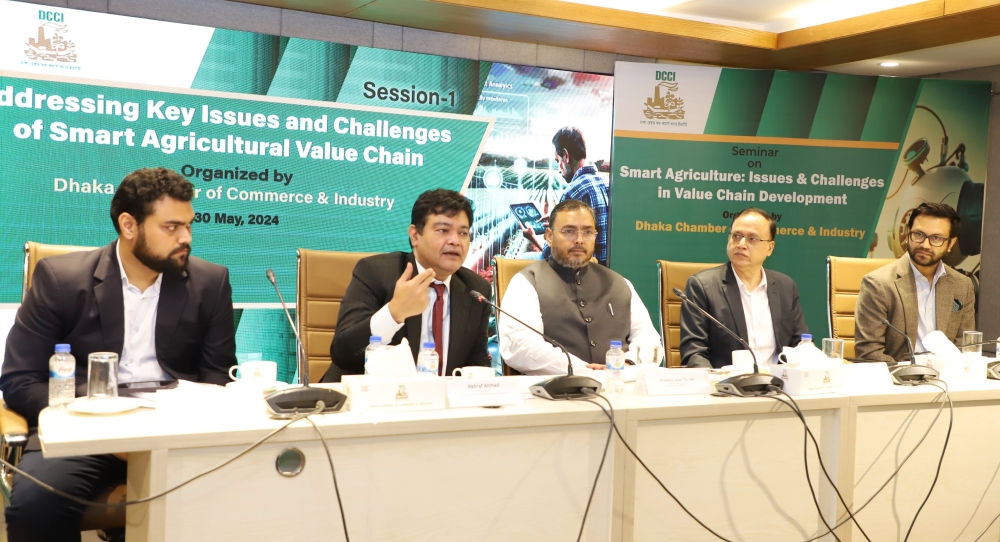News
Seminar on Smart Agriculture: Issues and Challenges in Value Chain Development

Adoption of smart agriculture practices like precision agriculture could potentially increase agricultural productivity by 20 to 30 per cent, reduce input costs by up to 20 per cent and increase farmers' income by 30 to 40 per cent, speakers told at a seminar on “Smart Agriculture: Issues and Challenges in Value Chain Development” organized by Dhaka Chamber of Commerce & Industry (DCCI) at its auditorium on May 30, 2024.
DCCI President Ashraf Ahmed said that from the farmers to the consumers we see at least 40-45% post-harvest loss. He said logistic chain and market chain are two very important but separate challenges. He also said that to mitigate post-harvest losses, cool-chain and smoother transportation system are necessary, he emphasized. Moreover, we should develop a waste management system so that we can recycle the agriculture wastages into other product. He termed inefficiencies in the supply chain; market access barriers and limited value addition are few bottlenecks for accelerating value chain development in Bangladesh's agriculture sector. But our mobile financial service (MFS) network in Bangladesh is impressively strong and if we want we can get the subsidy to the hand of farmers directly through MFS within a short time. Later, he also emphasized for an updated database to create a smart agriculture environment.
State Minister for Commerce Ahasanul Islam Titu, MP was present on the occasion as the chief guest. He said that a full functioning one point service desk will be established at DCCI soon to provide online IRC and ERC issuance facilities to the importers and exporters. By the end of this year all services of RJSC will also be paperless, he further informed. He also emphasized for a need based locally tailored farmers-friendly technology to implement smart agriculture in the country. The State Minister said that it is equally important to ensure better and logical price both for producers and consumers and for that he underscored the need for a smooth supply chain process including adequate organized commodity markets across the country. He also said that standardization and certification process will ensure better and genuine product specifying the exact origin of variety. He again informed that the Logistic Policy-2024 is going to be a game-changer for the businessmen. He again reiterated the need of ICT backed research and innovation to bring in more diversification in our product basket.
Md. Shamsul Arefin, Secretary, Information and Communication Technology Division of the government was present as the special guest. He said that for smart agriculture we need to make our farmers or producers smart. He also stressed on smart innovation, research and development and a strong knowledge based economy in the agriculture sector. Without smart government no other sector can be smart, he mentioned. He said smart citizen and skilled government officers having good human attribute, honesty and integrity will help government to be smart.
Malik Talha Ismail Bari, Senior Vice President of DCCI in his welcome remarks said, in recent decades, Bangladesh has made a significant stride in agricultural development. But climate change poses a severe threat, with increasing frequency of floods, cyclones and droughts that disrupt agricultural productivity a lot. Additionally, traditional farming practices often result in low productivity and inefficiencies. To address these multifaceted challenges, we must embrace smart agriculture solutions that leverage technology, data and innovative practices. Smart agriculture promises to revolutionize the way we cultivate, process and distribute our agricultural products, he added.
Fahad Ifaz, Co-Founder & CEO, iFarmer Limited presented the first keynote paper on “Opportunities of Frontier Tech Automation in Agro Value Chain”. He highlighted that frontier technology in agriculture can reduce information asymmetries for farmers, facilitate greater access to market and services, reduce cost, reduce climate impact, improve yielding. According to McKinsey and Company, frontier technology in agriculture could potentially add USD500 billion to world GDP by 2030, he added. He also sought policy support for an improved technological ecosystem for the overall agro system. He also urged for a farmer-friendly smart agriculture data ecosystem.
Mohammad Sakib Khaled, Senior Manager- Programme, Swisscontact presented another keynote paper on “Addressing Key Issues and Challenges of Smart Agricultural Value Chain”. He said that in order to fight against the climate change we need a massive transformation of agriculture sector. He also said that local investment in the livestock sector is increasing in Bangladesh and in next ten years it will be doubled. Limited supply of quality inputs, lack of good agricultural practices, post-harvest loss, climate vulnerability, lack of integrated supply chain and lack of policy implementation are responsible for our overarching gaps in the agriculture value chain. He also recommended for formulating and implementing agri-tech facilitating policies, ensuring digital literacy.
In the panel discussion session, Md. Abdul Kader, National Senior Lead Agronomist, FAO Representation in Bangladesh, Anwar Faruque, Vice President, BSAFE Foundation & Former Secretary, Ministry of Agriculture, Dr. Md. Abu Bakkar Siddique, Additional Director, Agricultural Credit Department, Bangladesh Bank, Sayed Rizban Hussain, Chief Executive Officer, Aqualink Bangladesh Limited, Dr. Kashfia Ahmed, CEO & Founder, Win Incorporate, Medina Ali, Founder/CEO, Dr. Chashi Incorporation, Dr. Muhammad Risalat Siddique, Director & CEO, Kranti Associates Limited took part and shared their comments. The speakers emphasized for low cost farmers-friendly locally manufactured device and database, ensuring competitive price for the farmers and policy support to implement smart agriculture. They also urged for good agricultural practice (GAP) and utilizing ICT for commercial farming.
DCCI Vice President Md. Junaed Ibna Ali and members of the Board of Directors among others were present during the event.
Published on: 2024-05-30
